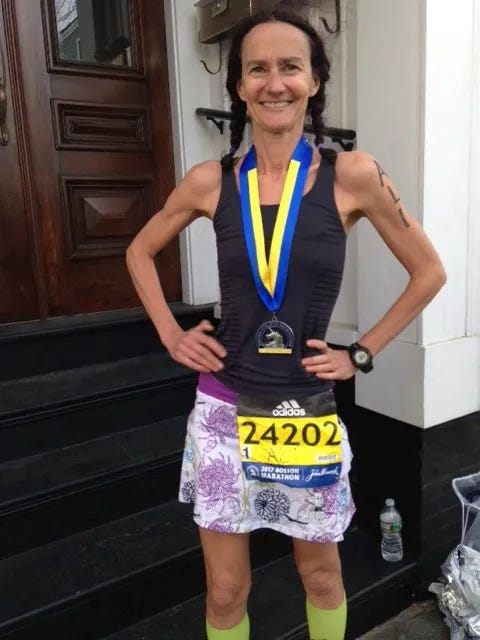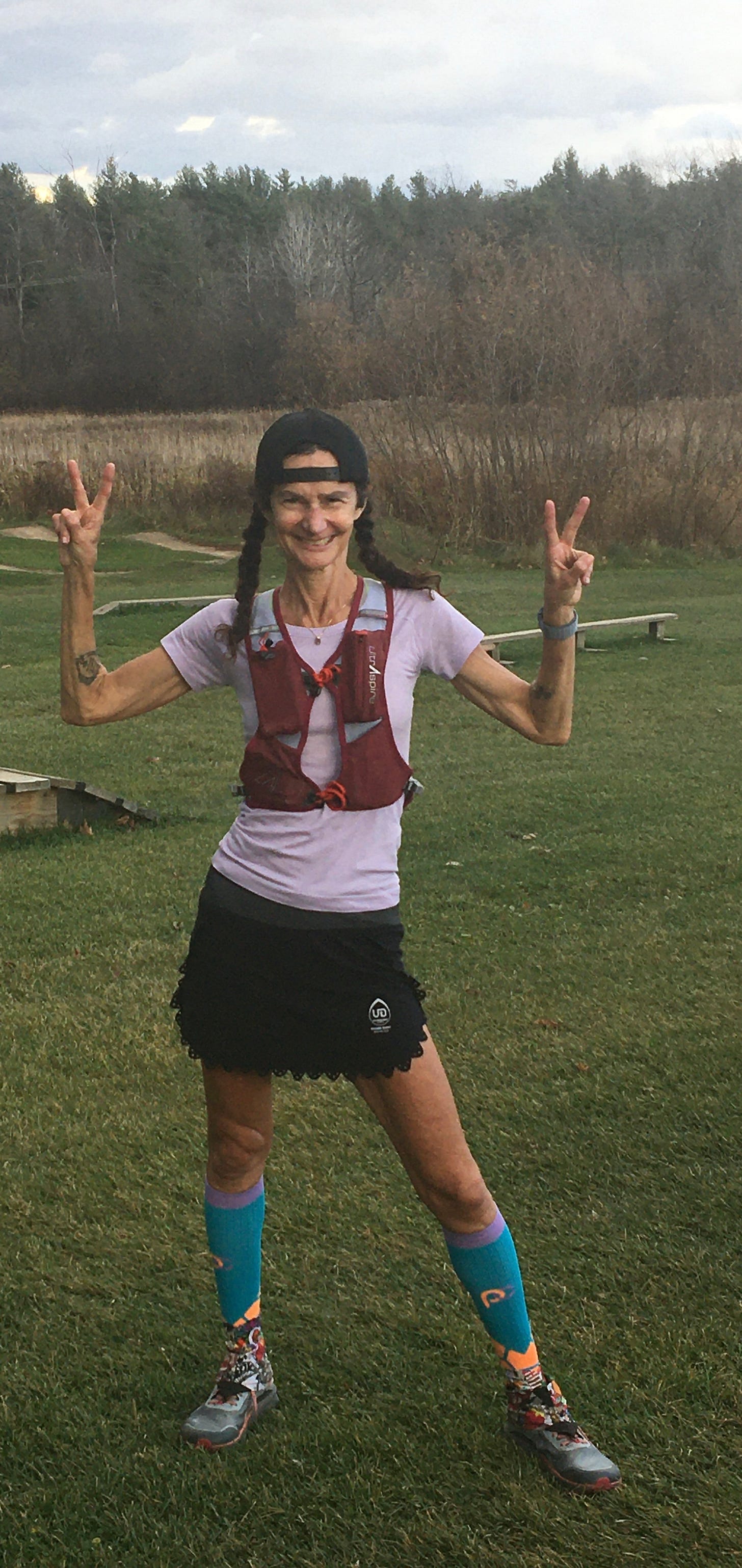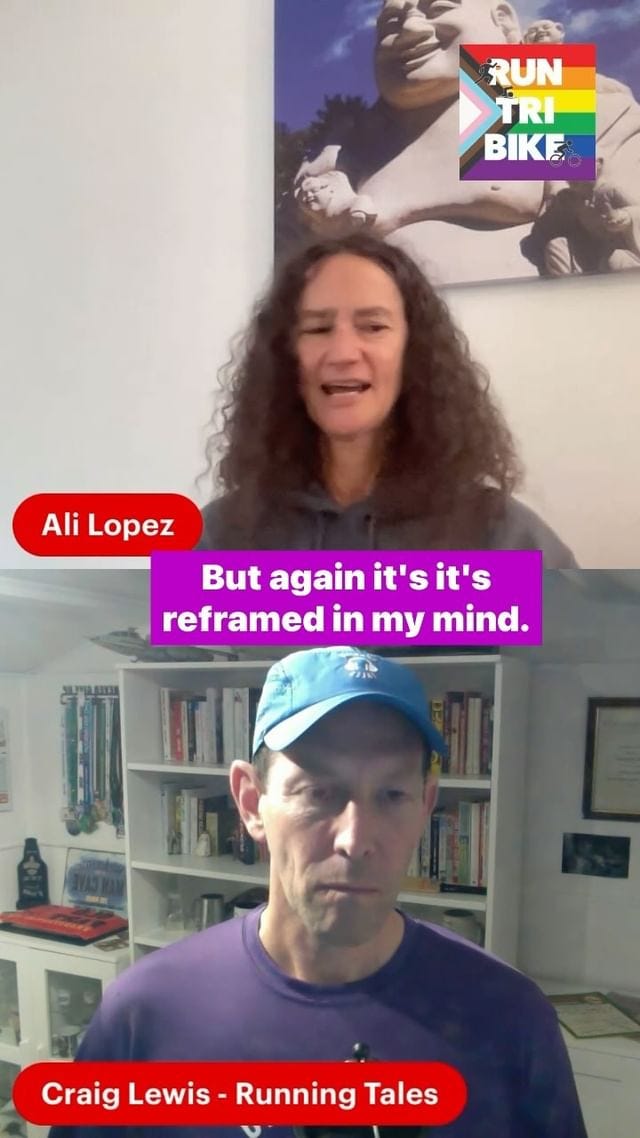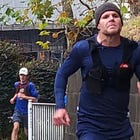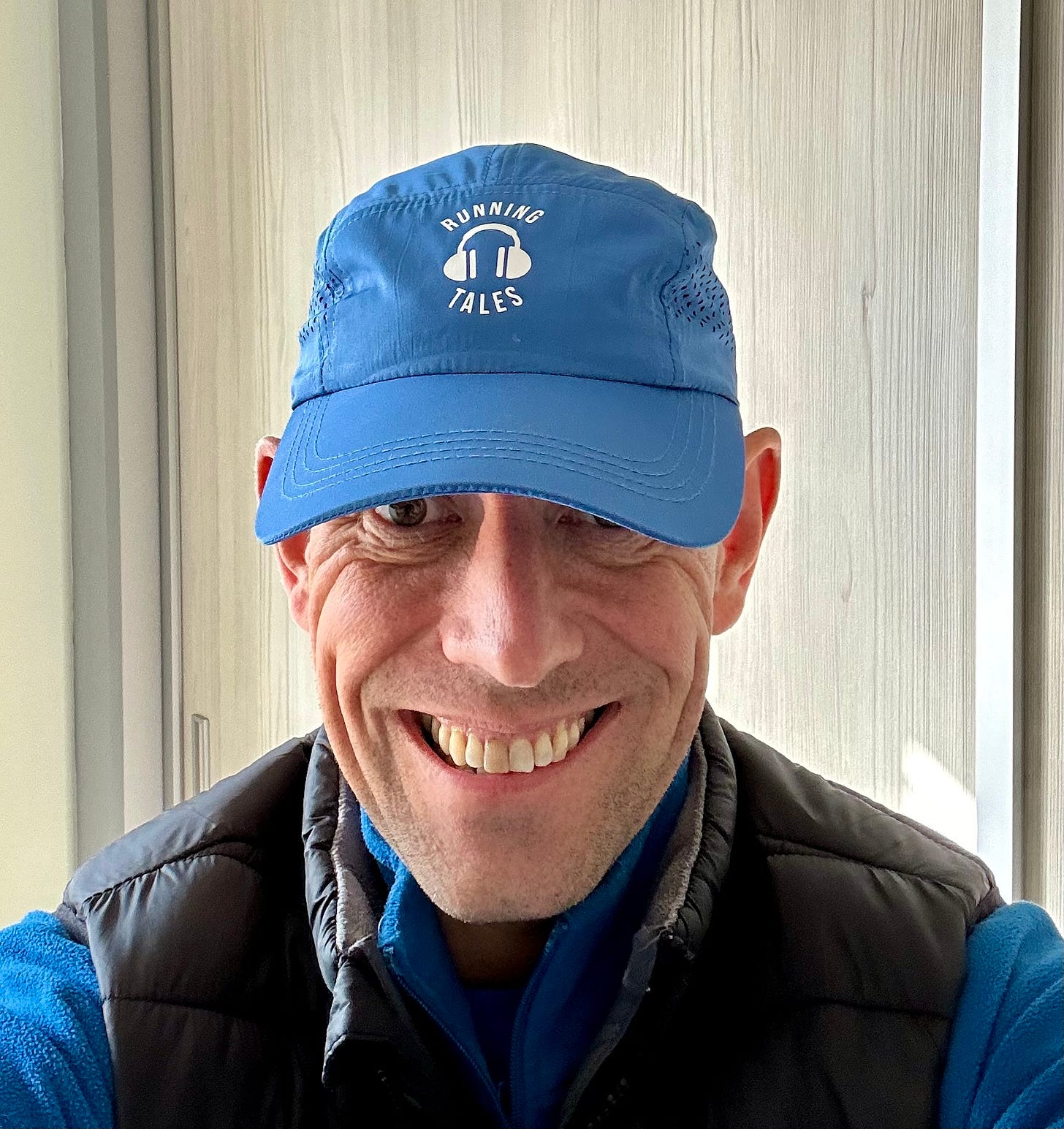Ali Lopez: The ultra runner who found all of life in one 100-mile day
From floods to a serious eye injury, nothing could stop Ali’s journey toward gaining her home state hundred buckle
How do you live “life in a day”?
For Ali Lopez, she found it while running 100 miles through her home state.
The 63-year-old conquered her first 100-miler at the Vermont 100 earlier this year, an experience she compares to battling the highs and lows of life as a whole.
Indeed, Ali’s journey to 100-mile success has been paved by many such ups and downs.
The joy of completing her first half-marathon, qualifying for and competing in the Boston Marathon, and finishing distances over 50 and 100 kilometres have been countered by a freak eye injury and the most important race of her life being cancelled due to flooding.
It all prepared her for the challenge of an event during which there were many moments she didn’t know how she was going to finish.
One mantra that helped get Ali through was remembering that running “is a hard thing you pick to do”.
“There's so many hard things in life that we all have that we don't have a choice in,” she said. “But I chose this because this is fun, this is what I want to be doing - even though it might not seem like it in that moment when you're dry heaving on the side of the road or not able to pick yourself up.
“You know that it'll pass because it will. And that was part of life in a day.
“You might feel amazing, but don't hold on to that, because in another hour, you're going to be crying on the side of the road, and then you're going to be happy again - and that’s just like life.”
She told the Running Tales Podcast that there are so many parallels between life and running: “We have to learn how to cope with highs as well as lows, because you will get carried away by that high - you feel amazing and you run up that hill way too fast, and then you get to the top and you're like, okay, what did I just do?
“Just like when you get carried away in something really exciting in your life, you may act a bit crazy at certain points.
“The other part we have to remember, in life and running, is that we don't have to do it by ourselves.
“In ultra running, especially with the volunteers, the people who are cheering for you or other people, it's all about community.
“I didn't know how I was going to finish that race, but when I was sitting in my chair with my head between my knees, unable to stand to go to the bathroom, my crew told me not to worry, it was their job to figure things out.
“I just had to trust them. And I think in life, too, if we just learn that if somebody tells us something's going to be okay, then maybe it will be.
“Maybe it won't, but maybe it will. And maybe we just need to trust a little more in the process.”
‘Living in the woods’ and qualifying for Boston:
That process - as far as running was concerned - started later in life for Ali, a non-athletic teenager who “smoked until I was 27” and battled eating disorders.
Although she later took up mountain biking, sport was not a major part of her life until she decided to run a half-marathon - aged 48.
It had been after what she calls one of her “many moves” that Ali found herself unable to continue with the biking - and so turned to running.
“I lived in the woods,” she said, “and so, I started running around dirt roads and things like that.
“That’s where it started, but I didn't get the hook right away.”
That hook came later when a friend told her about a half-marathon she was training for.
Ali thought the race “sounded cool,” so she signed up. Suddenly, the woman who had shunned sport had a goal, “something I could work towards”.
In fact, that planned first half-marathon - the Philadelphia Half - ended up being Ali’s second tilt at a competitive 13.1-miles after another friend recommended an event in Vermont to her.
The smaller race became her first half as Ali ended up running a half-marathon as a training run for what had been supposed to be her first event.
Just a year later, she was taking on the Philadelphia Marathon, an event that was her first 26.2-mile stepping stone on a route to what is the ‘Mecca of Marathons’ for many runners: Boston.
Ali, though, didn’t initially feel that way about the iconic race. As a born and bred New Yorker, her thoughts had originally been focused on the Big Apple’s marathon.
After finishing her first marathon at Philadelphia in a more than respectable four hours 20, Ali had decided a sub-four finish was a realistic goal.
Finishes of four hours two minutes and, even more agonisingly, four hours and two seconds followed. Undeterred, Ali tried again - and managed to hit the other side of the target, sneaking home in three hours and 59 minutes.
She said: “Amazingly, it qualified me for Boston because the year I did it, I had just bumped up an age group.
“It’s funny because my goal wasn't even to qualify for Boston. My goal was to break four hours.
“When I did, somebody said you probably qualify for Boston with that. But I didn’t really care about running that race just because it was big.
“I'm from New York. New York, Boston. There's that rivalry. It's not my city. It’s a big race, but I'd love to do New York.”
She was eventually convinced it was an opportunity she couldn’t turn down - a decision she wouldn’t regret.
“It was amazing,” she said. “You feel like a rock star for the day.
“You ride the subway for free. You just walk around the city feeling like a king or a queen.
“I have never seen so many people lining a course. It was pretty cool.”
Becoming the Queen of the Loops:
With Boston under her belt, Ali was to move on from marathon to trail and ultimately ultra running.
She originally made the switch as she had no desire to keep chasing times at marathon events. Instead, she took on a backyard style race, running four mile loops over six hours.
“You could run one loop and then you could sit and chat with somebody for an hour if you wanted,” she said.
“I just had a blast coming back through the start/finish each time, chatting with people and eating all sorts of things.
“I wasn't eating gels and chews. I was eating quesadillas and peanut butter. And I was like, ‘this is amazing’.”
Ali described the event as a “party and a picnic,” and managed to clock up an impressive 32 miles over the six hours.
She told Running Tales: “The people were amazing. Everyone was so supportive. it was very laid back, and I loved the community of it.
“I think that's what got me sucked into it.”
Since then, Ali has acquired a reputation among her friends for specialising in looped events, earning herself the nickname, ‘The Queen of the Loops’.
She called it a format which brings “constant, constant excitement” with no real logistics to deal with in the way a point-to-point has.
How a freak accident left Ali learning to run again:
Eventually though even the lure of the loops wasn’t enough for Ali as she continued to crave new experiences and new races.
“I did a few 50ks that way,” she said. “And I have gone back to repeat races, but for the most part now I don't really like to because I feel like there's too much out there.
“I want to experience a lot of different environments, a lot of different types of courses.”
It was that way of thinking that led Ali to make the jump to a 50-mile race, a challenge she completed despite fearing it was something she could never do.
“I didn’t even know how to train for something like that,” Ali said.
“My friend, Erika, told me to keep doing what I was and I’d be fine. So, I did, and it was!
“But I think that's what hooked me. Thinking, ‘wow, this was really hard’. It was hard because I didn't know what I was getting into, but every time I thought it was hard, I thought about how Erika was still out there as she was doing 100.
“And then when I was done in 12 or 13 hours, I thought, ‘oh, my gosh, it's getting dark and she's only halfway through’.”
Despite having conquered her fear of 50, it was that concern about the dark which - for a long time - told Ali that a 100-miler would be a step, or literally several thousand steps, too far.
Her worries were far from irrational. A few years earlier, Ali had suffered a severe eye injury in a freak exercise band accident. It had left her struggling with depth perception and her peripheral vision, issues which were exacerbated at night.
The accident happened seven years ago, when an exercise band she was using to help with a shoulder injury snapped and flew at her “like a slingshot”.
The band hit her in her left eye, leaving her with a detached retina. It took four or five surgeries before she was able to regain her vision.
“I didn't know if I would have any vision again,” she said. “During my rehab, I would come back from a surgery and put my hand over my right eye to see if I could see anything. And it was black.
“I just kept having to say, ‘okay, well, they said it was going to be like this, it's going to take time’.”
That time included two months when she wasn’t even allowed to walk and was told to stay on her couch.
She said: “The recovery was really my hardest ultra.
“My first run back was a 5k race. And I literally cried at the end. Not because I hated the 5k, but because I was running again.”
Ali said over the years the vision in her left eye slowly improved and she learnt to cope with the long-term effects of the injury.
“The human body is pretty amazing. My right eye has compensated so much that I feel like my vision has, over the last couple of years, got a little bit better.
“I still don't have the peripheral. Some people would why I run trails if my depth reception is so bad, but I love them.
“I just have to slow down more than I used to because I don't want to fall. Or at least fall more. We all still fall!”
Falling in love with the Vermont 100:
Despite her eye injury and running at night doubts, the route to 100-miles was written in the stars.
Ali said Vermont is a state she is constantly pulled back to. In a life where she has “worked in a lot of different places, a lot of different states,” it is somewhere she has returned to five different times in 25 years.
Some of the people she had met during that time were running the Vermont 100, but she had refused the offer - “I like to sleep” - and decided to volunteer instead.
“I had done 100k, and really had no interest in 100 miles,” she added.
“I didn’t really need to go overnight. My vision issues meant I was also worried about running at night.
“But I decided, you know what, I'm in Vermont I'm going to volunteer. So, in 2022, I signed up to volunteer at the Vermont 100.
“And it was the most amazing experience outside of running a race.”
Ali said she met a couple at an aid station and they spent the whole day volunteering together.
She loved the experience so much that when Lisa, the woman she’d volunteered with, sent her a message saying a lottery bypass was available to one person per aid station, her answer to the 100-miler question had changed.
“I said, if I do this, will you be my crew? That was my caveat.
“They said yes, so I signed up for it.”
How ‘horrendous flooding’ postponed but couldn’t stop Ali’s 100-mile dream:
There are plenty of challenges presented by extreme ultras. Tired and chaffing limbs, insufficient nutrition, inhospitable terrain and, of course, the weather.
But while Ali was prepared - as far as anyone can be for a 100-mile event - for all on-course eventualities, she couldn’t have expected the impact the last of those factors listed above would have.
Three days before the 2023 edition of the Vermont 100, the state was hit be torrential flooding.
“It was devastating, catastrophic,” Ali said. “Just horrendous, horrendous flooding.
“Actually seeing what's going on in Asheville (North Carolina; as a result of Hurricane Helene) now brings me immense PTSD remembering the flooding then.”
In the run up to the event, entrants received a string of emails from organisers, each painting a more grim picture than the last.
Eventually, the inevitable cancellation followed: “It was the only decision they could make, because you couldn't put people's lives at risk.
“Yes, it was heartbreaking, but it was more heartbreaking to see what happened to my State.“
But Ali wasn’t deterred. With her heart now set on running the Vermont 100, she shunned the idea of taking on a different race and entered the 2024 version.
“I needed a race that I had my heart tied to because that's what was going to pull me through at mile 70,” she said.
“I love the training and I think you have to because cancellations can happen with any race.
“You train and train and train and then something happens and so you say I did all that training for nothing - that’s not it at all for me.
“I had so many fun training runs with different friends and so many adventures that I still felt like it wasn't wasted.”
Despite a scare a week before the 2024 race when flooding hit Vermont again, the event took place and Ali was pitched into her “life in a day”.
Why running ‘brings things back into focus’ and exemplifies the power of the body:
Ali’s Vermont 100 experience was everything she hoped it would be and more, but of course, even life in a day is followed by night just as highs are followed by lows.
Incredibly, when an inspired Ali decided to follow-up her success at Vermont by running the Yeti 100-mile Endurance Run on the Virginia Creeper Trail her efforts once more fell foul of the weather.
The race, set to take place at the end of September this year, was washed out due to flooding resulting from Hurricane Helene.
Ali said: “The race director was heartbroken because not only did he have to cancel the race, but people were unaccounted for.
“Houses were floating down the river. It was really bad. The town of Damascus, where the race was supposed to go to, was almost not there.
“So, while it was sad not to be able to run the race, my heart just went out to all of the people and I knew that was the right decision.
“After I got the [cancellation] email, I needed to go burn some energy so I went into town and I ran up every hill I could find.
“I got my Yeti 10 Miler! A chance to release, to cry and smile and be grateful.”
Ali said she is now aiming to race Yeti 100 next year, another chance to take on life in a day.
More importantly, she intends to keep on running and embracing life to the full.
Part of this attitude comes from the way running has enabled her to reframe her relationship with her body.
As a teenager, Ali suffered from anorexia, a disorder which morphed into bulimia in her early 20s and saw her hospitalised twice.
She said running has helped her to realise her body is capable of achieving so much more than it “what it looks like”.
She said: “My body can do all of these amazing things as long as I feed it, and I can't not feed it anymore.
“I now look at my body in a different way than I've ever looked at it before.
“I look at people doing these amazing, amazing accomplishments including people older than me, and it constantly amazes me [what the human body can do].
“If we tell ourselves we can't do something, we can't do something. I didn't know how I was going to finish that race, but it was never in my head not to.
“The desire was always there. When people joke that 99% of running a race is mental and the rest is mental, it really, truly is.
“You have to have some physical ability. You have to be able to train. But I think so many more people could do so much more than they realise, athletically or not, just because of what we tell ourselves.
“People ask me why I love running, and it's because it brings things back into focus. When you’re out on a run, you have some of the most amazing thoughts that you're going to have - not related to running, just related to your life.”
Running 100 miles saw Ali Lopez cope with all of the ups and downs life can throw at you.
More importantly, it told her she could deal with them.
Watch and listen to Ali on the Running Tales Podcast:
Watch on Facebook, Instagram or on YouTube.
Listen on Spotify and Apple Podcasts.
Ali Lopez on Substack:
Ali’s writes about her running - and her life as a ‘writer, cooker, daughter, sister, auntie, partner, friend,’ in her Substack newsletter, Next Obvious Thing.
She’s written about her experience running the Vermont 100 and not running The Yeti 100 - you can read those posts here:
7 headlamps and salted coke - read how Ali conquered the Vermont 100
Not Yeti - read Ali’s account of how flooding ruined her plans to run a second 100-miler
Support Running Tales:
Please help us keep producing Running Tales across Substack and in podcast form:
Also on Running Tales:
Check out our merchandise:
The merch is better than the model:
Be a part of the Running Tales revolution with our new merchandise range.
We’ve got buffs, caps, cups, t-shirts and hoodies - why not complete your next run as an everyday runner by doing extraordinary things?





